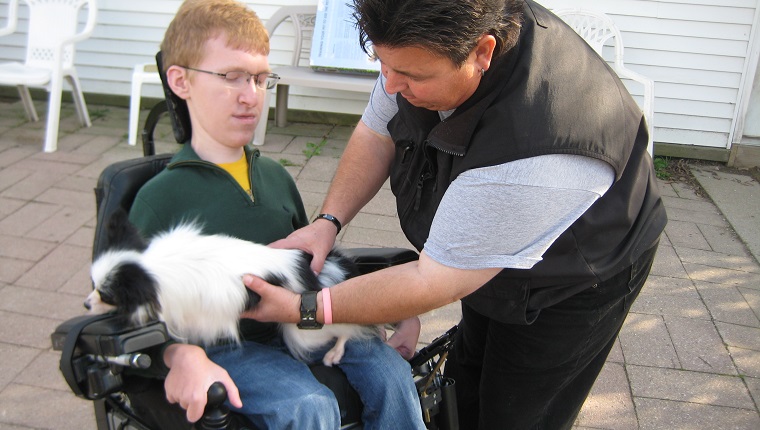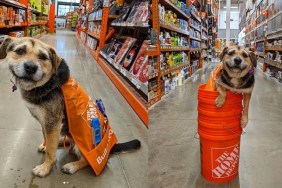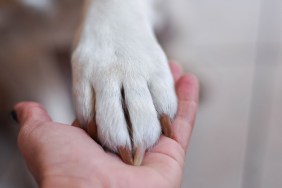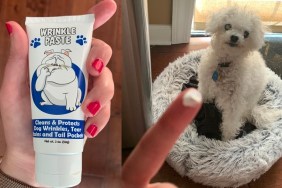We pet parents love our dogs, and we couldn’t imagine life without them. But some people rely on their animals for more than just love and companionship.
Service dogs are different from pets, therapy animals, and even emotional support animals. They provide specific services to persons with disabilities or medical conditions, and they accompany their humans in their day-to-day activities.
I had the pleasure of interviewing my friend and former neighbor, Kevin Fritz. Kevin is an associate for the international law firm Seyfarth Shaw LLP and lives with two rescue dogs and his retired service dog, Piper.
What Does A Corporate Accessibility Lawyer Do?
AMANDA: Kevin, thank you so much for taking the time to talk to us. Can you tell us a little bit about your role at work?
KEVIN: Sure! I’m a corporate lawyer. I work with businesses that are facing employment issues, as well as businesses that are open to the public, including hotels, restaurants, baseball stadiums, et cetera, that are facing some sort of discrimination complaint.
We give them counseling about accessibility issues — bathrooms, all those sorts of things — and represent their interests in the event of a lawsuit. I also do a lot of discrimination avoidance/proactive counseling to avoid lawsuits.
Questions we get about that include, “I want to hire someone, but I don’t know how,” or, “Someone is requesting time off, and I don’t know how to accommodate that — if I should or if I shouldn’t.”
AMANDA: Wow! That’s awesome. That must keep you pretty busy.
KEVIN: It does, but it’s not my whole life. I moved to Florida about a year ago from the windy city of Chicago. I did it to make time for other ventures outside of my day job, but I’m really glad I was able to work something out with my firm to continue working remotely.
It’s really about trying to balance everything. The Florida weather and water have been helpful with my mobility. The weather is very harsh in Chicago, and this is a better way to navigate all of that.
Living With Muscular Dystrophy
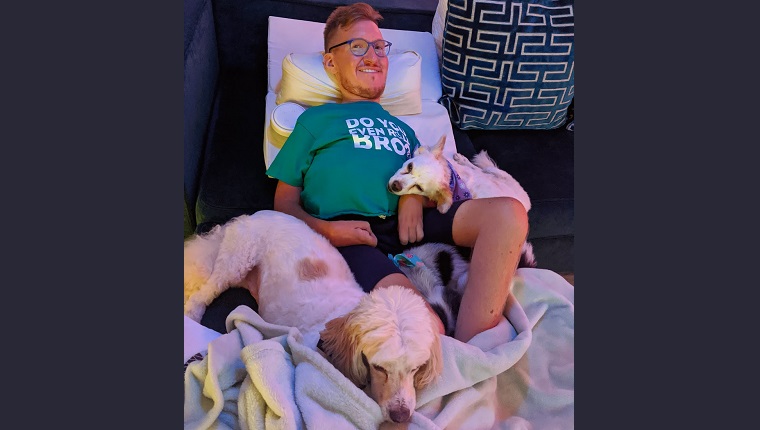
AMANDA: Would you mind telling us a bit about your disability?
KEVIN: I don’t mind talking about disability — I always say, just don’t call me “retarded” or “crippled.” It’s actually surprising, in our modern age, that it does still happen, and that’s one of the reasons I became a lawyer. I want to work with businesses to educate how to bring attention to, and talk about, disability.
The fact that I’m disabled, myself, allows for a really unique relationship with my clients because I can speak from my my first-hand experiences.
[Find more tips about how to speak with individuals who are disabled by checking out this awesome video series Kevin and his law firm put together in honor of the 30th anniversary of the Americans with Disabilities Act!]
I have muscular dystrophy. I have a certain form called Spinal Muscular Atrophy, which is pretty rare. It’s a little bit like ALS, but not as severe.
My disability is only physical, so I deal with things a lot of people take for granted, like walking. My hands are very limited; I can’t move my hands much at all. I can’t reach my face, and I can no longer type (I used to be able to).
Physically, I can talk and move my hands two inches all the way around. So I definitely use a lot of technology for typing, by voice and by using a special type of mouse. I also rely on my wheelchair to get around, and I love to travel!
In the morning, I get set up for my workday with the help of my personal assistant. If I have to use the bathroom or eat throughout the day, or something like that, I call for help from my assistant, who stays at my place during the workday.
I do have human assistants, but no one lives with me. I like to have privacy. It’s important to me. I think privacy is important to all people, disabled or not. We should have a choice.
Deciding To Get A Service Dog

AMANDA: When did you get a service dog?
KEVIN: I got Piper in 2008. Before that, I lived in a college dorm, Beckwith Hall, that was very accessible. They helped with everything related to personal care.
That’s why I chose the University of Illinois at Urbana-Champaign in the first place — it’s the most accessible university in the country. I knew they’d be able to accommodate my significant needs.
When I tried to move out of the dorm into an apartment, I knew I would need to find people to help me all the time. There were certain little things, though, that I wanted to try to do without needing so much help.
Remember, this was 2008, so a lot of the technology we take for granted now, like voice-activated things, just was not there yet.
AMANDA: That makes sense. How did you start the process of getting Piper?
KEVIN: I had spoken to some different people about getting a service dog. I had talked about getting a big service dog. But then I realized I wanted a dog that I could keep very close to me for snuggling purposes!
But in all seriousness, I wanted to find a dog who could grab things and bring them all the way up to my face, if necessary.
I researched “small dogs that are very smart” and found a few breeds that I liked, like Japanese Chins and Pugs (I love the little folds in their faces!). I was able to contact a trainer in Michigan, Cheryl Carlson. That’s where it all started.
I wanted this trainer to be the one to tell me do what type of dog to get because I knew she would have the knowledge and experience to train it.
By the way, there is no such thing as a certified service dog. This is something I counsel a lot of my clients about because businesses sometimes ask for a certificate or something like that when a person brings their service animal.
There are a lot of companies that put out “certifications” you can pay for, but there are no requirements to for a service dog under the ADA.
A Papillon Service Dog?
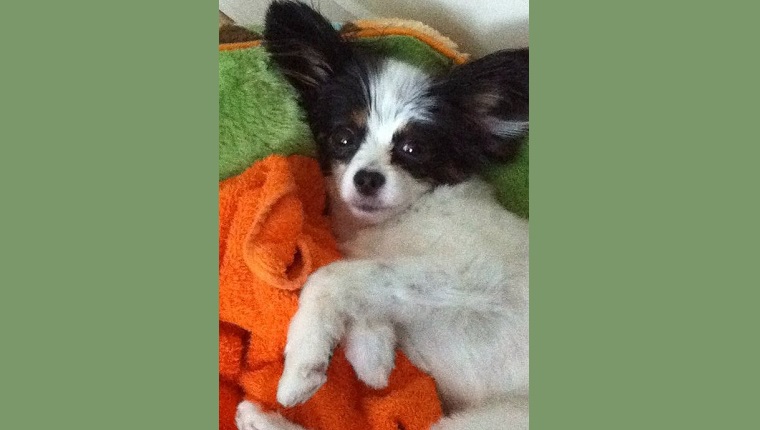
AMANDA: What was your conversation like with the trainer?
KEVIN: She trained police dogs, so I knew she’d be able to help me. When I reached out to her, I told her a little bit about my life. I told her I’d like a small dog who responded to voice commands.
I didn’t know what breed to get, but I told her the few breeds I liked. When I asked her what to do, she recommended Papillons. She said they have the right temperament, as well as being smart, lightweight, quick, and not as yappy as Chihuahuas.
AMANDA: What did you do next?
KEVIN: I found a breeder near the trainer in Michigan — remember, I was still at UIUC [central Illinois], so this was a bit tricky — and they had Papillons. I told the breeder what my situation was and that I needed the Papillon to be a working dog, and not just a play dog.
The trainer told me to get one that was a little bit older, because Papillons are immature as puppies, in that they don’t really get into their personalities until they’re a little bit older.
It was really just happenstance that the breeder had a dog she could no longer show because her ear wasn’t black enough. Apparently, they used to use hair dye so that it didn’t show during competition!
She was a beautiful show dog, but they couldn’t breed her because of her coloration deformity. They said they were going to retire her as a show dog and keep her around the house. It felt like Cinderella for some reason!
And, honestly, it made me feel connected in a way because I also look a little different, and I also have been told to hide my true self to fit in. So it really resonated with me.
Anyway, I knew I knew there wouldn’t be much of a life for this dog, and I was drawn to her story. They let me buy her. I said, “If you’re not going to do anything with this animal, let me see if I can give her purpose in my life.” It was one of the best decisions I ever made!
Meeting Piper
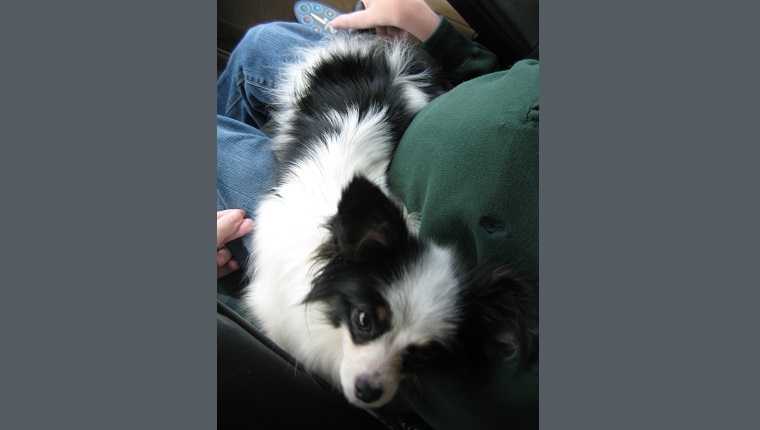
AMANDA: What a sweet beginning to your story!
KEVIN: Thanks! The trainer then drove up to the breeder. They did some tests to see what information came about. She had the right temperament; she wouldn’t cry — there were certain things the trainer wanted to assess, in terms of how fragile Piper would be, et cetera.
Fun fact, her name was “Painter” when I first got her!
I drove up to Michigan with two of my personal assistants, after buying her sight unseen. The breeder had her spayed, but she was not trained when I first met her.
I had her in my lap between spots in Michigan, and we dropped her off the same day at the trainer for three months of hard work! Even though I didn’t know her at all, it was like she knew me already, that I would be her owner. She was nuzzling in my lap, even without any training.
Piper The Wonder Dog!

AMANDA: That’s adorable!
KEVIN: She is! Then I talked to the trainer, about what I wanted her to do. In the end, I was really happy with the amount of commands the trainer could achieve with Piper.
She trained Piper to be a verbal dog. If I said, “Come here,” “Get up,” “Go over there,” “Go to the bathroom,” she listened. We trained her to be out on her own without a leash, so she could go to the bathroom with just me by myself.
She really learned everything about my voice, when I was upset, like if she was going towards the street, it was not the right thing to do.
I don’t know how we both did it, but the trainer was absolutely right when she said, “Within a year, you won’t even need to give her commands — she’ll just know.”
Piper really didn’t need any commands after that first year. Our communication is through our bond; it’s really hard for me to articulate, but I’ve never experienced anything like it!
AMANDA: That’s incredible! Piper sounds brilliant!
KEVIN: Her whole life, she’s been very accommodating and deferential, and that is from her training. If someone reaches down to grab her, she knows how to sit still. If she is in someone’s way, she knows to move.
I credit the trainer for a lot. She taught her up/down, switch (wrong location), pick up, put back, guard. With “guard,” she would bark or growl if I said “Guard” when someone came near me.
Training A Service Dog Takes Patience
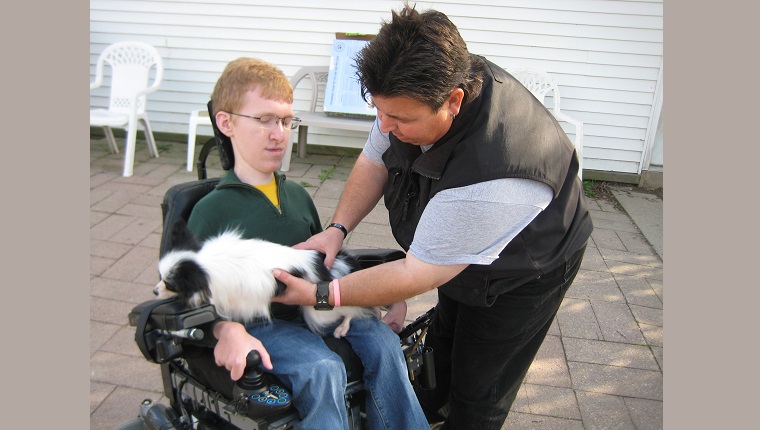
AMANDA: Wow, that’s so neat. Was it always like that?
KEVIN: When I first got her, training wasn’t easy. When I had the “installation” with the breeder, it was tricky. Piper knew the commands, but she trained somewhere else with a different human, so I didn’t know how that would transfer to me in-person.
I really wasn’t sure, at first, because Piper didn’t quite get it.
I learned that, with any animal, it’s about being patient. The dog isn’t going to just get it right away. It’s really going to take time, energy, and patience.
That was a huge thing that I didn’t have, as a 20-year-old. I was very impatient back then. The trainer had to remind me, “Kevin, this is a dog, not a robot. She needs time.”
AMANDA: That’s really great advice.
KEVIN: The most difficult experience I remember occurred pretty early on when she got too close to my chair and I accidentally rolled over her paw. I was devastated. 300 pounds of pressure on eight ounces of animal!
You could see as she was screaming in pain, that she was confused as to why I would hurt her, because all she ever wanted when she was in pain was to be close to me. It was so awful, and it was a terrible moment for both of us, but it was also a very good learning experience.
Both of us learned that day that we both have to be more aware of our surroundings. For me, I had to learn there was a small, living creature near me at all times. For her, she had to realize that if the chair was moving, she needed to get out of the way.
AMANDA: Ah, that’s so tough for both of you! I’m sorry that happened, but I’m glad she was okay and learned a safety lesson for the future. Thanks for sharing the tough moments, too.
Life With Piper Now, A Beautiful Retirement
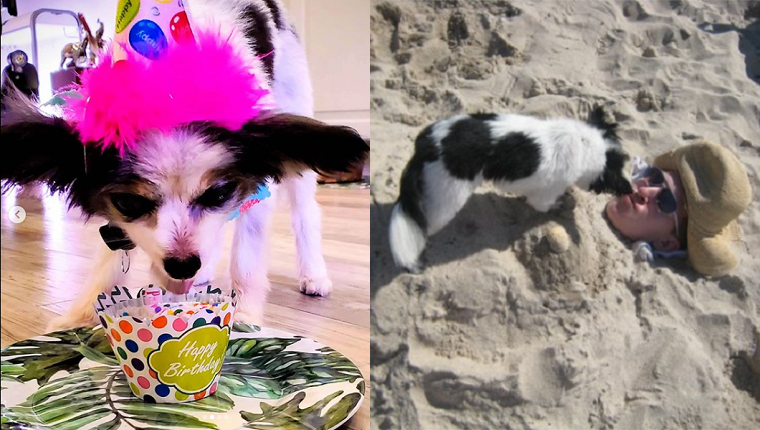
AMANDA: What is your relationship like with Piper now?
KEVIN: Now, she is very much retired. This past August was her 14th birthday. She can no longer see or hear, and she has no teeth. But she is a fighter, and, honestly, the move to Florida was a great thing for her because her appetite has increased, along with her energy.
She still jumps around at dinner time, which is so cute to watch. But now, she pretty much sits on top of my feet all the time. From the moment I get in my wheelchair, until the moment I go to bed, she is sitting there — truly, that is no exaggeration! You can tell she feels safe there.
Honestly, I don’t know what I’m going to do without Piper. It makes me emotional just to think about it. But I know when she’s ready to go, she’ll go.
We have a very special bond. I think our animals speak to us in a way that doesn’t use auditory language.
If I’m scared, Piper shakes also. She knows something is wrong. I also know if Piper isn’t doing well, and I can sense it by the way she interacts with me. After all, I feel her heartbeat all day long on my feet.
I know if she tells me it’s time to go, I will let her go. I owe her that kindness. She knows how important she is to me. While she certainly is not a service dog for me anymore, she continues to be “man’s best friend,” and I love her so very much.
AMANDA: I’m crying; that is so, so sweet.
KEVIN: I will never get another animal like Piper. She’s an animal who’s been literally feet away from me during the most significant moments of my life. I was a sophomore/junior in college when I got her.
All these years later, we’ve had so many memories together: we attended the Obama inauguration (I used to work for the guy!); went to law school together. She was there through my first meaningful adult romantic relationship and breakup; through family deaths.
She was there when I got my first job, when I moved — every meaningful life event, she’s been right there with me.
Expanding the Family
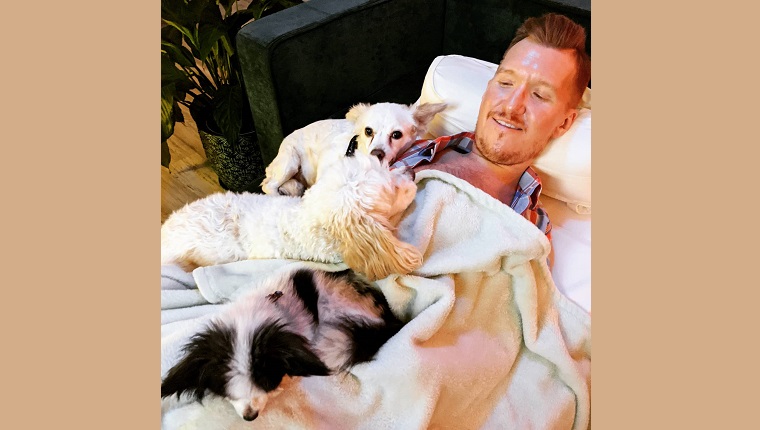
AMANDA: Piper is a very lovable dog. I know there are no other Pipers out there, but I saw she has some new adopted siblings! Tell me about them!
KEVIN: I have two other dogs. I do think service dogs can live in multi-dog families. The other two dogs are rescues from Chicago; they sort of just fell in my lap because of an unfortunate situation with their previous owner.
They were very squeamish when I got them and afraid of people, not to mention my wheelchair! But they have come a long way through socialization and are just another part of the family now!
AMANDA: That was so sweet of you. Did they get along right away?
KEVIN: All three of them have very different personalities, and it is so interesting to watch them interact with each other and with me. There were some issues at first with “who was in charge,” but I reminded them that I was the one in charge, and they’d all better behave! Ha ha!
If they were not getting along, I knew that separating them would calm their nerves, so I just gave them their own space. They eventually figured out how to cohabitate together. They each have their own spot on the bed next to me!
AMANDA: What is life like with them?
KEVIN: As a corporate lawyer, I work a lot, so when I have downtime I really just love to lie on the couch with my three dogs and relax. We love to just cuddle and be together.
It’s amazing, because even though the other dogs weren’t trained, they know I am disabled. They are not as rough with me as they are with other people.
One of my dogs, Champion, knows if he wants to be pet, he needs to put his head under my hand to help me lift it. Talk about physical therapy! Animals are amazing creatures!
The other, Paloma, is not big, but she’s dense. She knows when she’s with me, not to trample over me. They’re nothing like that with other people. They know to be more gentle with me.
I really don’t know why or how these dogs intuitively understand that I’m different. But they know, and they know how to treat me.
AMANDA: What a beautiful story! I’m so glad for your little family.
Service Dog Advice
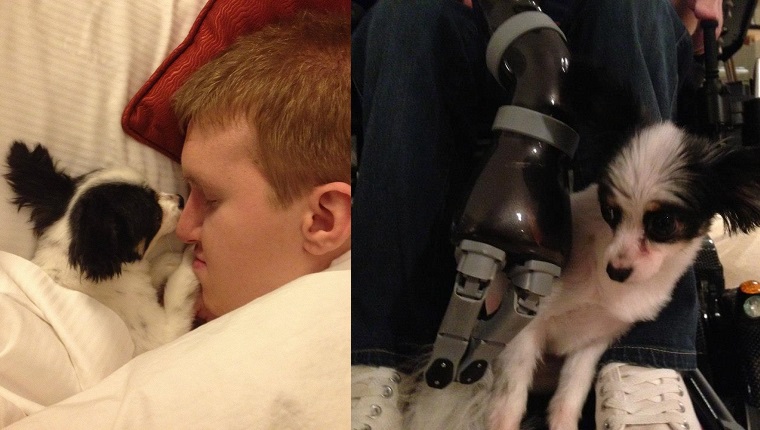
AMANDA: Would you recommend service dogs for other people with disabilities?
KEVIN: Absolutely. For my particular disability, I’m able to rely on technology, nowadays, to accommodate many of the things I needed Piper for while she was my active service dog.
There are so many other benefits to having a service dog, too. Even if you have a bad day, your dog can mean everything. Life is hard, especially now, with all the coronavirus stuff going on, but when you have a severe disability, it can be overwhelming.
So when I look at Piper, who is five pounds of pure love, it’s so beautiful. She makes me so happy, and she is absolutely adorable.
I recommend every disabled person have an animal — a dog, a cat, even a hermit crab! I think any person who has ever felt outcast or downtrodden or that they don’t matter get an animal.
It gives you a responsibility for something else, and it can get your mind off of matters you can’t control. If you can’t take care of your animal all by yourself, have your caregiver help you. Do not let that stop you!
We only have one life, and caring for an animal can bring a lot of purpose and responsibility, which I think are great things for people.
Papillons are very easy to take care of, very easy to house train. They don’t shed much at all. They’re very easy to manage.
Service dogs are very helpful, but they’re really there for companionship, too. They’re your shield, your armor.
AMANDA: Kevin, this is all wonderful advice and a beautiful story. Thank you so much for sharing your experience and tips with us.
To follow Kevin and Piper’s adventures, check out Kevin’s Instagram at @DashingWheelfellow.
Do you rely on a service dog? Do they have a special bond with you like Kevin has with Piper? Let us know in the comments below!
